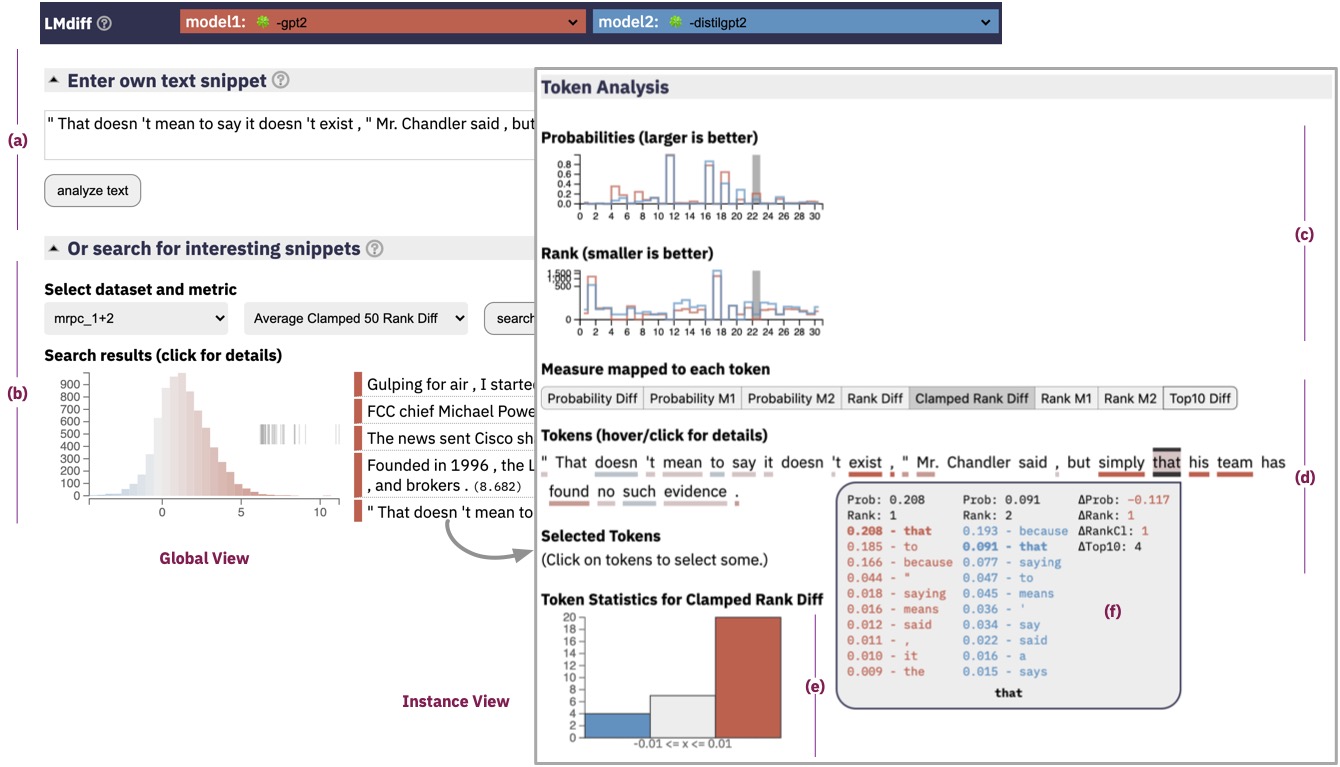Qualitative comparison of large language models.
Demo & Paper: http://lmdiff.net
LMdiff is a MIT-IBM
Watson AI Lab collaboration between:
Hendrik
Strobelt (IBM, MIT) ,
Benjamin Hoover
(IBM, GeorgiaTech),
Arvind
Satyanarayan (MIT),
and Sebastian
Gehrmann (HarvardNLP, Google).
From the root directory install Conda dependencies:
conda env create -f environment.yml
conda activate LMdiff
pip install -e .
Run the backend in development mode, deploying default models and configurations:
uvicorn backend.server:app --reload
Check the output for the right port (something like http://localhost:8000) and open in Browser.
This is optional, because we have a compiled version checked into this repo.
cd client
npm install
npm run build:backend
cd ..
To use your own models:
-
Create a
TextDatasetof phrases to analyzeYou can create the dataset file in several ways:
From a text file
So you have already collected all the phrases you want into a text file separated by newlines. Simply run:python scripts/make_dataset.py path/to/my_dataset.txt my_dataset -o folder/i/want/to/save/inFrom a python object (list of strings)
Want to only work within python?from analysis.create_dataset import create_text_dataset_from_object my_collection = ["Phrase 1", "My second phrase"] create_text_dataset_from_object(my_collection, "easy-first-dataset", "human_created", "folder/i/want/to/save/in")
From [Huggingface Datasets](https://huggingface.co/docs/datasets/)
It can be created from one of Huggingface's provided datasets with:from analysis.create_dataset import create_text_dataset_from_hf_datasets import datasets import path_fixes as pf glue_mrpc = datasets.load_dataset("glue", "mrpc", split="train") name = "glue_mrpc_train" def ds2str(glue): """(e.g.,) Turn the first 50 sentences of the dataset into sentence information""" sentences = glue['sentence1'][:50] return "\n".join(sentences) create_text_dataset_from_hf_datasets(glue_mrpc, name, ds2str, ds_type="human_created", outfpath=pf.DATASETS)
The dataset is a simple
.txtfile, with a new phrase on every line, and with a bit of required metadata header at the top. E.g.,--- checksum: 92247a369d5da32a44497be822d4a90879807a8751f5db3ff1926adbeca7ba28 name: dataset-dummy type: human_created --- This is sentence 1, please analyze this. Every line is a new phrase to pass to the model. I can keep adding phrases, so long as they are short enough to pass to the model. They don't even need to be one sentence long.The required fields in the header:
checksum:: A unique identifier for the state of that file. It can be calculated however you wish, but it should change if anything at all changes in the contents below (e.g., two phrases are transposed, a new phase added, or a period is added after a sentence)name:: The name of the dataset.type:: Eitherhuman_createdormachine_generatedif you want to compare on a dataset that was spit out by another model
Each line in the contents is a new phrase to compare in the language model. A few warnings:
- Make sure the phrases are short enough that they can be passed to the model given your memory constraints
- The dataset is fully loaded into memory to serve to the front end, so avoid creating a text file that is too large to fit in memory.
-
Choose two comparable models
Two models are comparable if they:
- Have the exact same tokenization scheme
- Have the exact same vocabulary
This allows us to do tokenwise comparisons on the model. For example, this could be:
- A pretrained model and a finetuned version of it (e.g.,
distilbert-base-casedanddistilbert-base-uncased-finetuned-sst-2-english) - A distilled version mimicking the original model (e.g.,
bert-base-casedanddistilbert-base-cased) - Different sizes of the same model architecture (e.g.,
gpt2andgpt2-large)
-
Preprocess the models on the chosen dataset
python scripts/preprocess.py all gpt2-medium distilgpt2 data/datasets/glue_mrpc_1+2.csv --output-dir data/sample/gpt2-glue-comparisons -
Start the app
python backend/server/main.py --config data/sample/gpt2-glue-comparisonsNote that if you use a different tokenization scheme than the default
gpt, you will need to tell the frontend how to visualize the tokens. For example, abertbased tokenization scheme:python backend/server/main.py --config data/sample/bert-glue-comparisons -t bert
Models and datasets for the deployed app are stored on the cloud and require a private .dvc/config file.
With the correct config:
dvc pull
will populate the data directories correctly for the deployed version.
Testing
make test
or
python -m pytest tests
All tests are stored in tests.
We like pnpm but npm works just as well. We also like Vite for its rapid hot module reloading and pleasant dev experience. This repository uses Vue as a reactive framework.
From the root directory:
cd client
pnpm install --save-dev
pnpm run dev
If you want to hit the backend routes, make sure to also run the uvicorn backend.server:app command from the project root.
For production (serve with Vite)
pnpm run serve
For production (serve with this repo's FastAPI server)
cd client
pnpm run build:backend
cd ..
uvicorn backend.server:app
Or the gunicorn command from above.
All artifacts are stored in the client/dist directory with the appropriate basepath.
For production (serve with external tooling like NGINX)
pnpm run build
All artifacts are stored in the client/dist directory.
- Check the endpoints by visiting
<localhost>:<port>/docs

